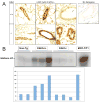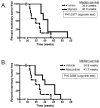Cdk2 is required for breast cancer mediated by the low-molecular-weight isoform of cyclin E
- PMID: 21385896
- PMCID: PMC3085722
- DOI: 10.1158/0008-5472.CAN-10-4086
Cdk2 is required for breast cancer mediated by the low-molecular-weight isoform of cyclin E
Abstract
Cyclin E activates Cdk2, controls centrosome duplication, and regulates histone gene transcription. Cyclin E is deregulated in cancer and appears as low-molecular-weight (LMW) isoforms that correlate strongly with decreased survival in breast cancer patients. Transgenic mice overexpressing LMW-cyclin E have increased incidence of mammary tumors and distant metastasis when compared with mice that had full-length cyclin E. To specifically test the requirement for Cdk2 in LMW-cyclin E-mediated mammary tumorigenesis, we generated transgenic mice, which expressed LMW-cyclin E in a Cdk2-deficient background. We found that mammary gland development proceeds relatively normally in these animals, indicating that Cdk2 kinase activity is largely dispensable for this process. However, Cdk2-deficient mice were completely resistant to LMW-cyclin E-mediated mammary tumors. Cdk2 wild-type or heterozygous mice succumbed to mammary tumors with mean latencies of 16 and 19.5 months, respectively, but Cdk2 nullizygous littermates did not display tumors through 24 months. Similarly, continuous administration of two different Cdk inhibitors significantly delayed LMW-cyclin E-induced mammary tumor progression. Triple transgenic mice generated in a p53 heterozygous background also displayed no tumors. Finally, we found that Cdk2 silencing induced cell death in LMW-overexpressing breast cancer cell lines, but not in cell lines lacking LMW expression. Our findings establish a requirement for Cdk2 in LMW-cyclin E-mediated mammary tumorigenesis, arguing that human breast tumors overexpressing LMW-cyclin E are prime candidates for anti-Cdk2 therapy.
Conflict of interest statement
Conflict of interest: All authors declare no conflict of interest.
Figures





References
-
- Spruck CH, Won KA, Reed SI. Deregulated cyclin E induces chromosome instability. Nature. 1999;401:297–300. - PubMed
-
- Hwang HC, Clurman BE. Cyclin E in normal and neoplastic cell cycles. Oncogene. 2005;24:2776–86. - PubMed
-
- Caldon CE, Sutherland RL, Musgrove EA. Cell cycle proteins in epithelial cell differentiation: Implications for breast cancer. Cell Cycle. 9 - PubMed
Publication types
MeSH terms
Substances
Grants and funding
LinkOut - more resources
Full Text Sources
Other Literature Sources
Molecular Biology Databases
Research Materials
Miscellaneous

